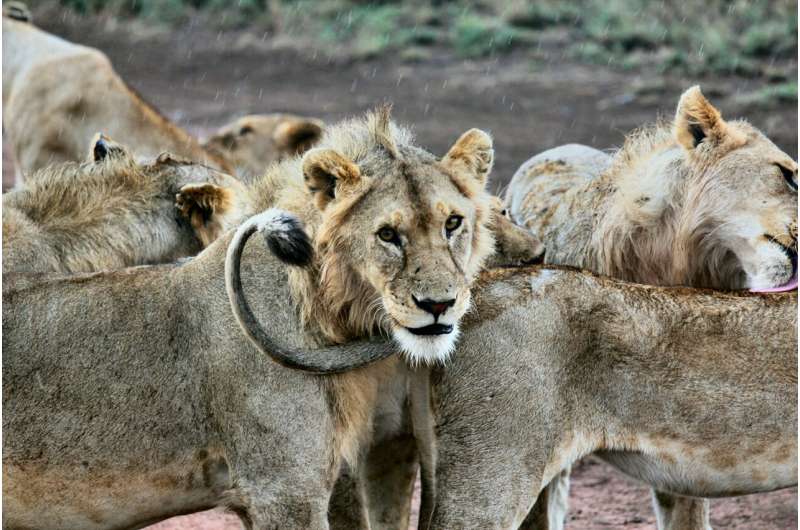This article has been reviewed according to Science X's editorial process and policies. Editors have highlighted the following attributes while ensuring the content's credibility:
fact-checked
peer-reviewed publication
trusted source
proofread
Male and female lions socialize differently throughout their lives, study reveals

New research from the University of Oxford on wild lions has revealed that males and females experience vastly different changes to their social network throughout their lives, and that this may shape their survival.
The paper, "Sex-specific social aging in wild African lions" published in Current Biology, offers new insight into the emerging topic of social aging: how individuals change their social behavior with age, and the consequences this has for other parts of their lives.
Among cats, African lions (Panthera leo) are unique in the extent to which they depend on social acquaintances for many essential processes, such as hunting and rearing cubs. But until now, it was not known how individual lion's social networks change as lions age and what this might mean for their survival.
This new study is the first time social aging has been investigated in wild lions and across generations and sexes at the same time.

Based on 30 years of data on the Serengeti lion population, the findings revealed several differences between sexes as they aged. For example, the strength of females' connections to males tends to be at its highest in midlife, and then declines as they age. Whereas females' social connection to other females declines linearly with age, being highest in early adulthood.
On the other hand, males' connection to other males is at its lowest in midlife, then increases again as they age. Males' social connection strength to females is highest in midlife, and lowest in early and late life.
For females, social connectivity to their "friends" is key for a long life, since females with stronger connections with their friends tend to live longer. For males, however, it is the raw number of friends which appears to be important for survival, since having a higher number of associates is associated with a longer lifespan.
Lead author Lauren Rudd (Department of Biology, University of Oxford) said, "The importance of close female bonds, particularly in early adulthood, could be because 'friends' can help protect against threats such as infanticidal males. They could also be valuable allies for territory defense, hunting, and cub rearing—all of which require cooperation. Combined these factors potentially explain why better-connected females live longer."
The study was based on over 150,000 field observations of 665 individual lions, collected by the Serengeti Lion Project between 1984 and 2013. These recorded where, when, and which lions were observed together on a daily basis.
Lauren Rudd added, "Understanding changes in sociality based on age and sex could help in predicting the dynamics of disease outbreaks in wild lion populations. For example, while aging females may be less exposed to pathogens as their social connections decline, aging males' exposure risk could increase as they gain new associates."
Our current understanding of how, and why, individuals change their social behavior as they age, and what consequences this social aging may hold, is limited.
Further work in this lion system is now underway to investigate how the loss of "friends" that an individual experiences as they go through their life might change their social behavior and their position in their social network. The aim is to shed light on the mechanisms behind social aging and provide insights into how the loss of some individuals may affect the remaining individuals in the population.
Going beyond this lion system, work in other wild animal societies is also beginning to investigate how the different sex roles might shape social aging in other systems too, just as seen in the lion population.
Co-author Dr. Josh Firth (Department of Biology, University of Oxford & University of Leeds) said, "Natural animal populations, where many individuals are being simultaneously monitored in detail across their entire lives and across many generations, offer unique opportunities to better understand social aging and how this process operates across many different types of societies."
More information: Lauren F. Rudd et al, Sex-specific social aging in wild African lions, Current Biology (2024). DOI: 10.1016/j.cub.2024.07.040
Journal information: Current Biology
Provided by University of Oxford



















